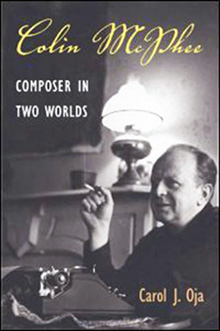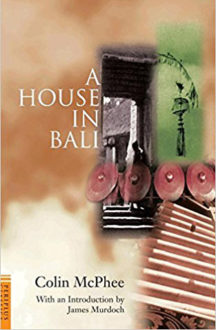 Colin McPhee:
Colin McPhee:
Composer in Two Worlds
by Carol J. Oja
Published by Smithsonian
Smithsonian Studies of American Musicians Series
Published November 17, 1990
History (biography)
450 pgs. • Find on Amazon.com
Reviewed by Stephen O. Murray
December 1, 2004
Although readers of composer Colin McPhee’s luminous memoir of spending most of the 1930s near Ubud on Bali, A House in Bali would not know it, McPhee (1900–1964) was very given to self-pity.
 I am far from being the only one who thinks he wrote prose better than he wrote music [1]“Tabu-Tabuhan” is available on several recordings with other compositions, usually his second (“Pastoral”) symphony; I highly recommend the recording of four McPhee works conducted by Dennis … Continue reading. Reading Carol Oja’s splendid and very sympathetic 1990 biography made me want to reach back in time and shake McPhee.
I am far from being the only one who thinks he wrote prose better than he wrote music [1]“Tabu-Tabuhan” is available on several recordings with other compositions, usually his second (“Pastoral”) symphony; I highly recommend the recording of four McPhee works conducted by Dennis … Continue reading. Reading Carol Oja’s splendid and very sympathetic 1990 biography made me want to reach back in time and shake McPhee.
When, with considerable difficulty, I found a copy of McPhee’s memoir, A House in Bali (first published in 1946), I felt that McPhee’s interest in Balinese boys (dancers and musicians—and I do mean “boys,” not young men) was at least partially erotic. Oja’s biography, Colin McPhee: Composer in Two Worlds first published in 1990) removes any doubts about that surmise.
The more astounding fact for readers of A House on Bali to absorb is that McPhee not only had a wife and that she was in residence in the famed house, but she underwrote the building of the compound, underwrote the revival of children’s gamelan (percussion orchestra), and more. McPhee did not mention Jane Belo [2]Barnard College student of the main organizer of academic anthropology in America, Franz Boas once in A House on Bali, though he would not have been able to live there and sponsor musicians without her money.[3]Belo wrote several important ethnographic books about Balinese culture, focusing particularly on trance behavior.

McPhee left Bali only a few days before the Dutch colonial officials “witch hunt against homosexuals”[4]the description is from Boas’s most famous student, Margaret Mead that netted Walter Spies, the central figure in the preservation of Balinese artistic traditions and their transmission to the West. Belo, who had married two homosexual men [5]painter/sculptor/writer George Biddle before McPhee but does not seem to have been a lesbian herself (although homosocial), was intensively investigated. She reported that “the Balinese think the whole white caste has gone mad” and also this statement of a man from Selat:
According to Balinese law “the offence [pederasty] is not recognized.” He went onto explain that “to be salah mekorenan (wrongly married) is to have relations with an animal, or for a man to take a girl not yet mature, or a woman of higher caste… Male with male cannot be mekorenan.”
Oja interviewed Balinese who remembered Colin McPhee and Jane Belo. She also interviewed seemingly all of the survivors into the 1980s of the inter-world-war music scene in New York dominated by Virgil Thompson, who, besides being a composer, was music critic for the New York Herald Tribune. She also went through the surviving, mostly undated McPhee papers at UCLA, the Belo papers imperiously incorporated with her own papers and deposited in the Library of Congress by Margaret Mead, and some other manuscript collections.
Oja’s admirable industriousness is matched by the ability to make sense of the jumble of material she found or elicited. To call her book the definitive biography would be inadequate praise for her achievement in constructing a fascinating and remarkable nonjudgmental narrative. (If I wanted to reach back and shake McPhee from reading about his self-pity, how much greater the provocation must have been for Oja spending much more time with the evidence of self-destructive and unpleasant behavior than I spent reading her report of it all!)

The book provides considerable insight into McPhee’s Canadian, Balinese, and New York milieux and some fascinating glimpses into the modus operandi in Bali of Margaret Mead and her then-husband Gregory Bateson. I think Oja somewhat underrates McPhee’s Balinese/western musical fusions, but she justly appreciates his incontrovertibly enduring work: the two great books, A House on Bali and the more technical musicological Music in Bali.
McPhee also authored A Club of Small Men: A Children’s Tale from Bali, which is also back in print. I think that Oja set off a revival of interest in McPhee, since none of his music was available on CD before it and A House on Bali was out of print in North America the year before her biography’s publication.
Also see John Coast’s memoir Dancing Out of Bali with some of the same characters as A House in Bali a decade later.
published on epinions 1 December 2004
©1992, 2004, 2017, Stephen O. Murray

